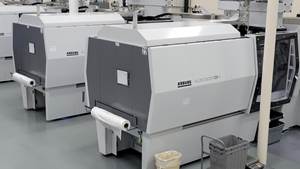Reshoring ‘Spark’ Helped Feed Thousands Post-Katrina
One emergency order leads to reshoring of other parts by a family-owned processor.
It was 2005. Hurricane Katrina had just destroyed the New Orleans area and the Federal Emergency Management Agency (FEMA) was putting survivors into mobile homes for emergency shelter. The mobile homes were outfitted with ovens/ranges so that survivors of the storm, which killed an estimated 1245 people, could cook and provide meals for their families.
These ovens/ranges were gas powered. To light them, one would first turn a burner knob, then the “spark” knob to ignite the gas. Some Katrina survivors were having difficulty adapting to the new cooking environment and safely igniting the gas, so FEMA decided to replace the black nylon spark knob with a red one to make the process more intuitive.
That sounds straightforward enough. Trouble was, the company that made the ovens, Atwood Mobile Products, Selinsgrove, Pa., had been importing all of its knobs from China. Under the challenges imposed by the deadly storm, and with the risk of injury from improper use of the stoves escalating, there wasn’t time to reorder new knobs and get them delivered to the Gulf States at a reasonable expense and time frame.
Enter GreenLeaf Industries, a custom injection molder in Lenoir City, Tenn. The molder was invited by Atwood to review its specifications, challenging production requirements—particularly in the area of decoration—and cycle-time demands. GreenLeaf won the bid, rebuilt a worn-out mold that had been mothballed after knob production moved to China, and began production in 2006, even with no screen-print artwork files on which to rely.
is a family-owned and operated Tier 2 automotive molder that has run only all-electric molding machines since it began in 1999. It has nine presses from ranging in size from 50 to 350 tons. At its 30,000 ft² plant, Greenleaf does molding, pad printing, and assembly of parts such as air outlets, glove-box hinges, trays and caps, and cup holders. Sales were $4.3 million in 2015. Automotive work—all of it for Japanese OEMs such as Acura, Honda, and Toyota—accounts for 70% of ┤¾Ž¾┤½├Į.
With a long history in molding nylon in red shades, GreenLeaf was able to offer the newly reshored client a solution in record time. Production was ramped up quickly to include 50,000 red knobs per week until all the mobile-home ovens/ranges had been retrofitted. Printing was particularly challenging because the knob is conical and the print area is convex. GreenLeaf engineers worked around the clock for two weeks to modify a screen printer to accept this difficult part, test ink adhesion, and develop new artwork.
As a result of this experience, Atwood brought back all knob production to the U.S. and named GreenLeaf its exclusive supplier, a distinction the molder still holds 10 years later. GreenLeaf is now also making oven handles for Atwood (another reshoring success) on its new all-electric 280-ton press from Sumitomo Demag. In fact, the oven handle is the first part GreenLeaf produced on the SE280HDZ.
Greenleaf standardized on Sumitomo Demag presses to simplify things for the plant employees, and because the machinery maker provides good service, parts, training, and advice from its sales and service facility in Norcross, Ga., says Lawrence Segrest, GreenLeaf CEO. The molder sold off its few non-Sumitomos and replaced them.
“The move to only Sumitomo Demag machines is part of Greenleaf’s decision two years ago to aim for excellence, to move beyond a defensive mindset from the Great Recession,” says Segrest.
Related Content
Medical and Molding Elite
When Jeff Smith received a notice evicting his promising ┤¾Ž¾┤½├Į out of his house, it could have been the end of Elite Biomedical Solutions’ and Elite Precision Plastics’ stories before they really got started, instead it was just the beginning.
Read MoreScaling New Heights With Vertical Integration
Eden Manufacturing was founded on a vision of vertical integration, adding advanced injection molding capabilities to a base of precision moldmaking and more recently bringing Swiss-type machining capabilities in-house.
Read MoreAbsolute Haitian Brings Next Generation of Presses to Orlando
NPE2024: Absolute Haitian says Generation 5 of the servo-hydraulic Haitian and electric Zhafir machines lines emphasize efficiency, performance and intelligence.
Read MoreConsistent Shots for Consistent Shots
An integral supplier in the effort to fast-track COVID-19 vaccine deployment, Retractable Technologies turned to Arburg and its PressurePilot technology to help deliver more than 500 million syringes during the pandemic.
Read MoreRead Next
Making the Circular Economy a Reality
Driven by brand owner demands and new worldwide legislation, the entire supply chain is working toward the shift to circularity, with some evidence the circular economy has already begun.
Read MorePeople 4.0 – How to Get Buy-In from Your Staff for Industry 4.0 Systems
Implementing a production monitoring system as the foundation of a ‘smart factory’ is about integrating people with new technology as much as it is about integrating machines and computers. Here are tips from a company that has gone through the process.
Read More










